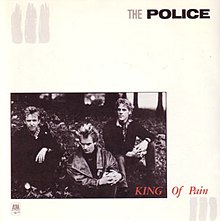King of Pain
| "King of Pain" | ||||||||
|---|---|---|---|---|---|---|---|---|
 |
||||||||
| Single by The Police | ||||||||
| from the album Synchronicity | ||||||||
| B-side |
|
|||||||
| Released | August 1983 US January 1984 UK |
|||||||
| Format |
|
|||||||
| Recorded | December 1982 at AIR Studios, Montserrat for basic tracks, then January–February 1983 at Le Studio, Quebec, Canada for overdubs and mixing | |||||||
| Genre | New wave | |||||||
| Length | 4:59 | |||||||
| Label | A&M – AM 176 | |||||||
| Writer(s) | Sting | |||||||
| Producer(s) |
|
|||||||
| The Police singles chronology | ||||||||
|
||||||||
|
||||||||
| "King of Pain" | ||||
|---|---|---|---|---|
 |
||||
| Single by Alanis Morissette | ||||
| from the album MTV Unplugged | ||||
| Released | 19 April 2000 | |||
| Format | CD single | |||
| Recorded | 18 September 1999 | |||
| Genre | Acoustic rock | |||
| Length | 4:05 | |||
| Label | Maverick Records, Reprise | |||
| Writer(s) | Sting | |||
| Producer(s) | Alanis Morissette | |||
| Alanis Morissette singles chronology | ||||
|
||||
"King of Pain" is a song by English rock band The Police, released as the final single from their fifth and final studio album Synchronicity (1983). Written by the band's lead singer and bassist Sting as a post-separation song from his wife, "King of Pain" conjures up symbols of pain and relates them to a man's soul. A&M Records released "King of Pain" as the album's fourth single in the UK, while in North America, it was released as the second single.
The song received acclaim from music critics, many of whom praised Sting's lyrics and cited the song as a highlight from Synchronicity. Reaching number three in the US Billboard Hot 100 chart in October 1983, and number one on the Billboard Top Tracks chart for five weeks in August 1983. In the United Kingdom, it reached number 17 in January 1984.
Multiple artists have covered "King of Pain". Canadian singer-songwriter Alanis Morissette covered the track for her MTV Unplugged album (1999) and released it as the second single from the album.
"King of Pain" was released as the second single in the US and the fourth single in the UK, taken from their fifth and final album, Synchronicity (1983). The song was released after "Every Breath You Take"'s eight-week appearance on top of the charts. Sting's fascination with Carl Jung and, to a greater extent, Arthur Koestler inspired him to write the track. As a Hungarian-born novelist who resided in England, Koestler was enthralled with parapsychology and the unexplained workings of the mind (he wrote the book titled The Ghost in the Machine in the late '60s, after which the Police named their fourth album). A music video was made but only released in Australia.
...
Wikipedia

